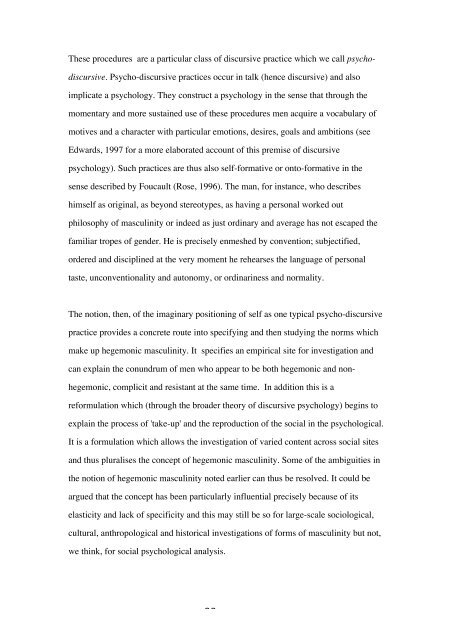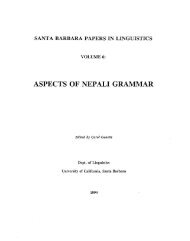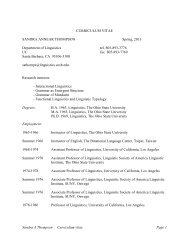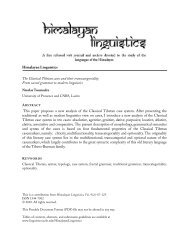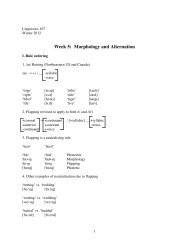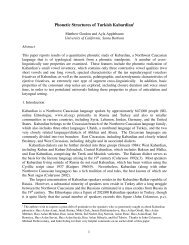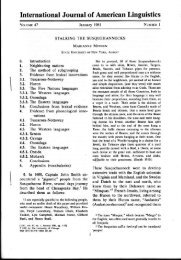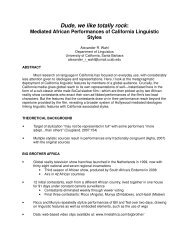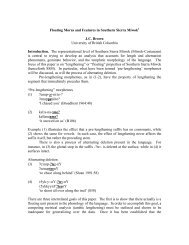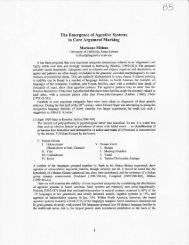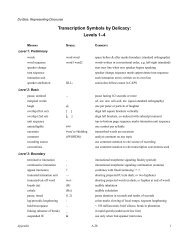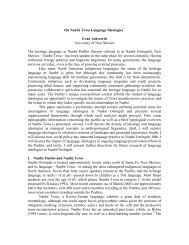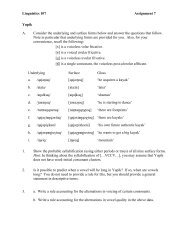Negotiating Hegemonic Masculinity: Imaginary ... - UCSB Linguistics
Negotiating Hegemonic Masculinity: Imaginary ... - UCSB Linguistics
Negotiating Hegemonic Masculinity: Imaginary ... - UCSB Linguistics
Create successful ePaper yourself
Turn your PDF publications into a flip-book with our unique Google optimized e-Paper software.
These procedures are a particular class of discursive practice which we call psycho-<br />
discursive. Psycho-discursive practices occur in talk (hence discursive) and also<br />
implicate a psychology. They construct a psychology in the sense that through the<br />
momentary and more sustained use of these procedures men acquire a vocabulary of<br />
motives and a character with particular emotions, desires, goals and ambitions (see<br />
Edwards, 1997 for a more elaborated account of this premise of discursive<br />
psychology). Such practices are thus also self-formative or onto-formative in the<br />
sense described by Foucault (Rose, 1996). The man, for instance, who describes<br />
himself as original, as beyond stereotypes, as having a personal worked out<br />
philosophy of masculinity or indeed as just ordinary and average has not escaped the<br />
familiar tropes of gender. He is precisely enmeshed by convention; subjectified,<br />
ordered and disciplined at the very moment he rehearses the language of personal<br />
taste, unconventionality and autonomy, or ordinariness and normality.<br />
The notion, then, of the imaginary positioning of self as one typical psycho-discursive<br />
practice provides a concrete route into specifying and then studying the norms which<br />
make up hegemonic masculinity. It specifies an empirical site for investigation and<br />
can explain the conundrum of men who appear to be both hegemonic and non-<br />
hegemonic, complicit and resistant at the same time. In addition this is a<br />
reformulation which (through the broader theory of discursive psychology) begins to<br />
explain the process of 'take-up' and the reproduction of the social in the psychological.<br />
It is a formulation which allows the investigation of varied content across social sites<br />
and thus pluralises the concept of hegemonic masculinity. Some of the ambiguities in<br />
the notion of hegemonic masculinity noted earlier can thus be resolved. It could be<br />
argued that the concept has been particularly influential precisely because of its<br />
elasticity and lack of specificity and this may still be so for large-scale sociological,<br />
cultural, anthropological and historical investigations of forms of masculinity but not,<br />
we think, for social psychological analysis.<br />
33


